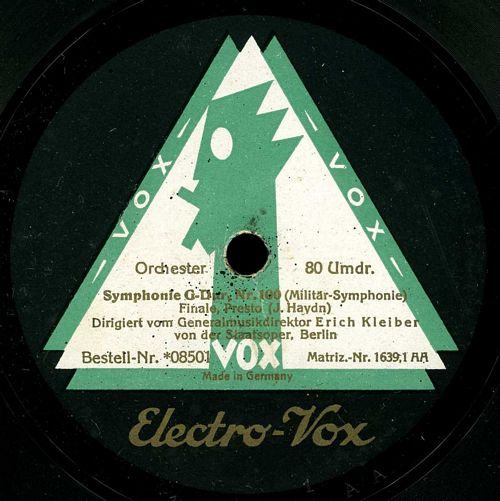Latest Additions to www.jolyon.com 
A site on the history of sound recording.
This page contains any recently added stuff and acts as a sort of staging post before I redistribute the recordings under the appropriate menu headings.
Recordings are in FLAC format downloadable through MediaFire by clicking on each title.
Anything highlighted in Blue denotes either a link to a sound file, or more information on another website.
Erich Kleiber, conducting an unnamed Berlin?
orchestra, [label states Dirigiert vom Generalmusikdirektor Erich Kleiber von der Staatsoper,
Berlin].
Haydn:
Symphony No. 100 in G Major [file size 57MB]
Recorded: c. 1926 The following notes have been kindly made available to me
by Alex McGehee. Alex is in the 'process of
completing a long term project on building a discography and analysis relating to the mid-50s Haydn renaissance of all the Haydn symphony recordings in the 20th
century'. So if anyone out there has any information on anything
obscure, unusual or otherwise unpublished info just contact him direct.
Erich Kleiber was remembered by the musicians who worked under him for his piercing sarcastic temper. He was an infinitely demanding conductor and an unremitting perfectionist. He is the least recorded of the big five conductors of his generation (Arturo Toscanini, Otto Klemperer, Wilhelm Furtwängler, and Bruno Walter).
Kleiber's recording of Haydn’s Symphony no. 100 in G major was made ca. 1926 by the German record company Vox (first released in 1927) and is not listed in any of the published discographies of the conductor, except as an on-line addendum to Carlos Dillon's book, and in
Rainer Lotz's unpublished "Vox Platten und Aufnahmen" (also available
on-line) which is the only work to cite the recording's release date.
The performance is a remarkable piece of work (Kleiber hated recording under the time restrictions of the day) and since the Victor recording of 1913 is a highly abridged arrangement for an extremely small group of players, Kleiber's efforts represent the first true recording of the work in the history of recorded sound. Kleiber and the Orchester der Staatsoper Berlin perform amazingly close to the currently established version of the score, which was published forty years after this recording was made and represents decades of musicological research and manuscript discoveries that Kleiber could not have benefitted from. The recording is clear evidence of the conductor's reputation for taking extraordinary pains to study the works he performed and to rehearse his ensemble with meticulous care.
Even so, in order to fit the symphony onto four sides of the Vox release, certain sacrifices had to be made. Using the score of the Joseph Haydn Werke, 17, ed. Horst Walter (Munich: G. Henle Verlag, 1966), 145, the following cuts are noted:
1st movement: Adagio – Allegro (289 mm.) The opening Adagio (23 mm.) is eliminated. The Allegro, which follows has no cuts, but obviously the repeats are not
observed.
2nd movement: Allegretto (186 mm.) A total of 31 mm. are cut. 20 mm. cut (1:00 minute in) where Haydn brings back the opening theme of the movement, and then 11 mm. are trimmed beginning at m. 81. Forced to make cuts to accommodate the time limits of two 78 rpm discs, Kleiber's decisions show unusual artistic care in his choice of what to sacrifice.
3rd movement: Menuet (80 mm.) No cuts. However, it is interesting to note that Kleiber makes an unusual decision to take the repeat in the first half of the Trio, but nowhere else. He also takes a significantly slower tempo for the Trio, which is not indicated in the score. Kleiber was probably working from some version of the Simrock edition, published in Bonn in the 19th century. Neither the Eulenberg or the Breitkopf & Härtel editions were published when he made his recording. The B & H contains numerous errors and the Simrock edition was actually a better source.
4th movement – Finale: Presto (334 mm.) No cuts. Kleiber takes the first repeat in the score at m. 8, but no other repeats. Note at 17:54 into the recording, there is a noticeable change in pitch (upwards) as the speed of the disc changes (at m.309).
Matrix: 1640-AA, 1638-AA 1637-AA
& 1639-AA
Cat. No. VOX 08500 & 08501
Format: 30cm
(12inch); double-sided green & white labels with gold lettering

